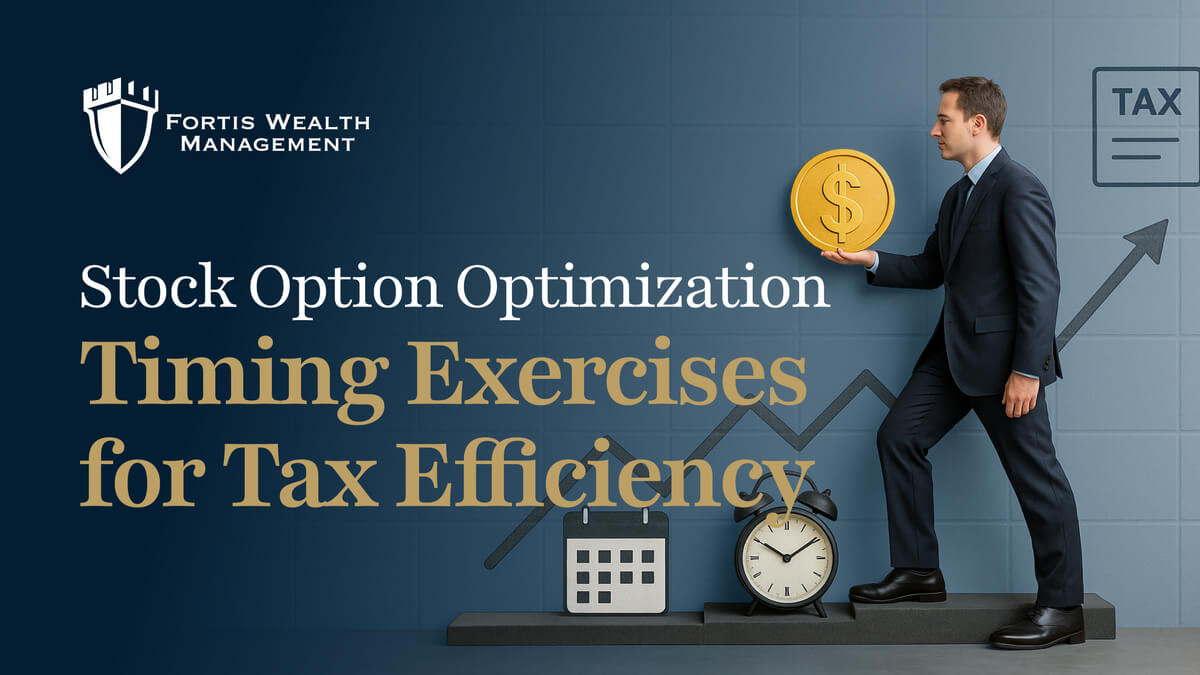Equity compensation is a powerful tool for aligning employee and company interests, especially among corporate executives and tech entrepreneurs. While its wealth-building potential is clear, the complex tax implications demand thoughtful planning. Without a strategic approach, you could lose a significant portion of your gains to taxes.
By understanding the various types of equity compensation, their tax treatment, and the best timing for exercise, you can make more informed decisions that strengthen your financial outcome and help you retain more of what you’ve earned.
Types of Equity Compensation
Equity compensation takes many forms, each with distinct characteristics and tax implications. Identifying the type of award you hold is the essential first step toward effective tax planning.
Stock Options
Stock options give you the right but not the obligation to purchase a company’s shares at a predetermined price, known as the exercise price or strike price, within a set time frame.
There are two main types of stock options:
Incentive Stock Option (ISO)
Incentive stock options (ISOs) may offer favorable tax treatment. When you exercise ISOs, you typically don’t owe regular income tax. Instead, the difference between the stock’s fair market value at exercise and the exercise price is factored into the alternative minimum tax (AMT).
If you meet specific holding period requirements, usually two years from the grant date and one year from the exercise date, the gain on the eventual sale of the shares qualifies for long-term capital gains tax rates. This preferred treatment makes ISOs attractive for long-term wealth building, though potential AMT implications should be carefully evaluated.
Non-Qualified Stock Options (NQSO)
Non-qualified stock options (NQSOs) have relatively straightforward tax treatment. When you exercise NQSOs, the difference between the stock’s fair market value at exercise and your exercise price is taxed as ordinary income. This income appears on your W-2, just like your salary or bonus, and is subject to federal income tax, Social Security, and Medicare.
Any gain on the stock’s value after exercise is taxed as a capital gain when you sell the shares. The rate depends on how long you have held the stock since exercising.
Restricted Stock Unit (RSU)
Restricted stock units (RSUs) are a company’s promise to grant you shares after a vesting period. Unlike stock options, there’s no exercise price to pay. Instead, the fair market value of the shares at vesting is treated as ordinary income and fully taxed.
Employers typically withhold shares or cash to cover taxes, and you receive the remaining net shares. If you continue holding the shares post-vesting, any future change in value is taxed as a capital gain or loss when sold. RSUs usually have simpler tax treatment than stock options since they don’t trigger the AMT, though the ordinary income at vesting remains a key tax event.
Tax Implications and Exercise Timing Strategies
The timing of your equity compensation exercise and sale plays a key role in shaping your tax outcome. For tech entrepreneurs and corporate professionals, a thoughtful strategy can reduce tax exposure and enhance long-term wealth potential.
Avoiding AMT Traps with ISOs
The AMT is a parallel tax system designed to ensure that higher-income individuals pay a minimum amount of tax, regardless of deductions or credits. For those with ISOs, the AMT can present challenges.
When you exercise ISOs, the difference between the exercise price and the stock’s fair market value on that date is considered an AMT “preference item.” This amount is added to your taxable income for AMT purposes, even if you don’t sell the shares. If your AMT liability exceeds your regular tax liability, you must pay the higher AMT amount.
To manage AMT exposure effectively, consider a phased exercise approach. Instead of exercising all your vested ISOs in a single year and facing a potentially steep AMT bill, you can spread exercises across multiple years. This strategy may help keep your AMT income below critical thresholds.
Alternatively, if your company permits it, a “same-day sale” (exercising and selling shares immediately) treats the spread as regular income and avoids the AMT adjustment altogether. However, this approach forfeits the long-term capital gains rate on the spread.
Consulting a financial advisor with expertise in equity compensation can help you model different scenarios and develop an exercise plan that balances AMT avoidance with long-term tax efficiency.
Managing NQSO and RSU Taxation
With RSUs and NQSOs, ordinary income is recognized when RSUs vest and when NQSOs are exercised. Planning around your total income for the year is key. If you anticipate a lower-income year, exercising NQSOs or allowing RSUs to vest during that period may result in a lower ordinary income tax rate. Conversely, in a high-income year, it may be advantageous to delay exercising NQSOs or deferring RSU vesting, if your plan allows.
For both NQSOs and RSUs, once shares are acquired, the capital gains holding period begins. Holding the shares for over a year after exercise (for NQSOs) or vesting (for RSUs) qualifies any subsequent gain for the more favorable long-term capital gains tax rate. This “hold to gain” strategy can enhance tax efficiency, assuming the company’s prospects are strong. However, it comes with market risk—share values can decline during the holding period.
Integrating Equity Compensation into Your Wealth Strategy
Effective tax planning for equity awards involves more than minimizing short-term tax liability. It’s about integrating these awards into your long-term financial plan, including evaluating specialized investments and tax planning services.
For tech founders and entrepreneurs, equity compensation can represent a large portion of personal net worth. Excessive concentration in a single company’s stock, especially your own, introduces risk. Reinvesting proceeds from stock exercises or sales into diversified holdings helps reduce exposure and support sustained wealth accumulation. Fortis Financial Group’s Total Wealth Solution provides a cohesive plan that integrates tax strategy, cash flow management, and investment decisions.
Beyond traditional diversification, exploring unique investment opportunities can enhance tax efficiency and long-term growth. One such solution is the Fortis Flagship Fund, designed for individuals seeking sophisticated strategies apart from conventional portfolios, especially those with significant equity compensation.
Start Maximizing Your Equity Compensation Today
Tax planning isn’t static. As your career progresses, equity awards vest, and tax laws evolve, periodic reviews with certified financial planners (CFPs) and certified public accountants (CPAs) can help you adjust your strategy to reflect these changes.
At Fortis Financial Group, our experts collaborate to develop integrated, customized strategies that make equity compensation a powerful contributor to your overall financial success. This kind of strategic planning empowers you to take full advantage of your equity opportunities for both the present and your long-term vision.
To maximize the value of your stock options and RSUs, a proactive and informed approach is essential. Understanding your equity compensation vehicles, their tax implications, and the timing of exercises and sales will help you build long-term wealth with clarity and confidence.
We’re committed to delivering personalized guidance. Our services, including Total Wealth Solution, Financial Planning, Retirement Planning, and Unique Investments, are designed to support your financial goals. Every dollar matters, and we’re here to help you make the most of each one.
Contact us today to take the next step toward your financial future.
Fortis Financial Group is a fiduciary wealth management firm based in Bellevue, WA, specializing in comprehensive retirement planning and investment management. We focus on helping our clients reduce stress by knowing when they can securely retire, stop overpaying taxes, and reduce the anxiety of financially navigating life transitions.



